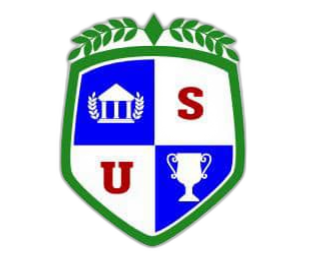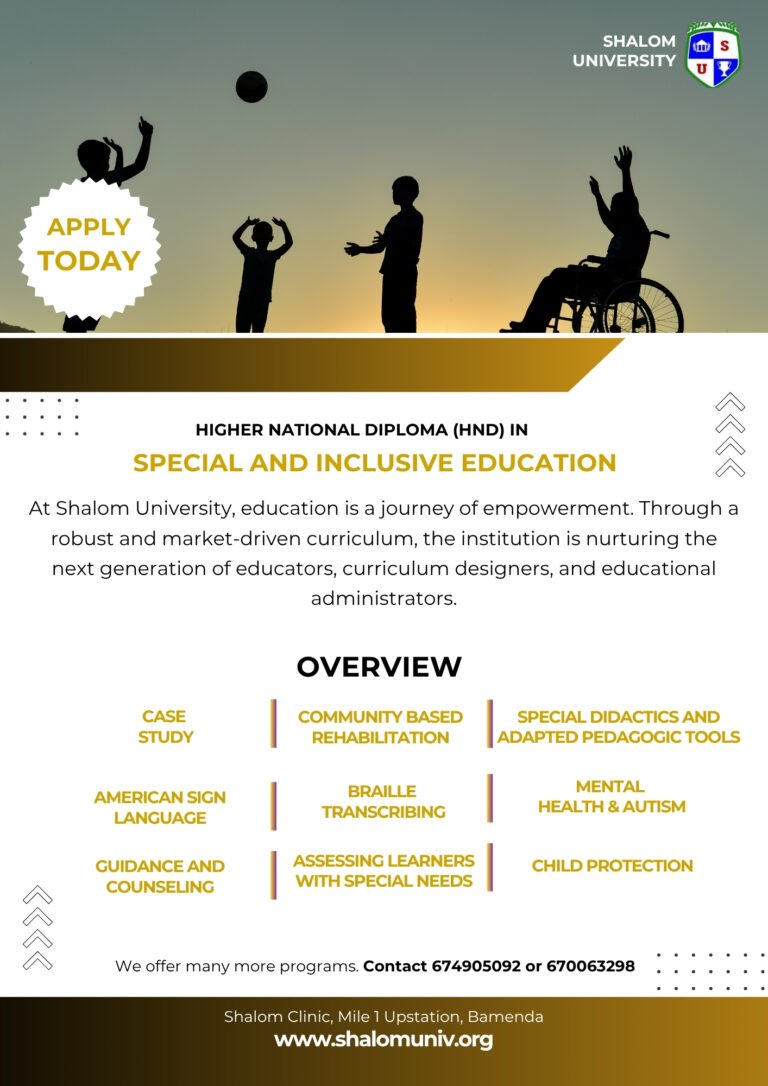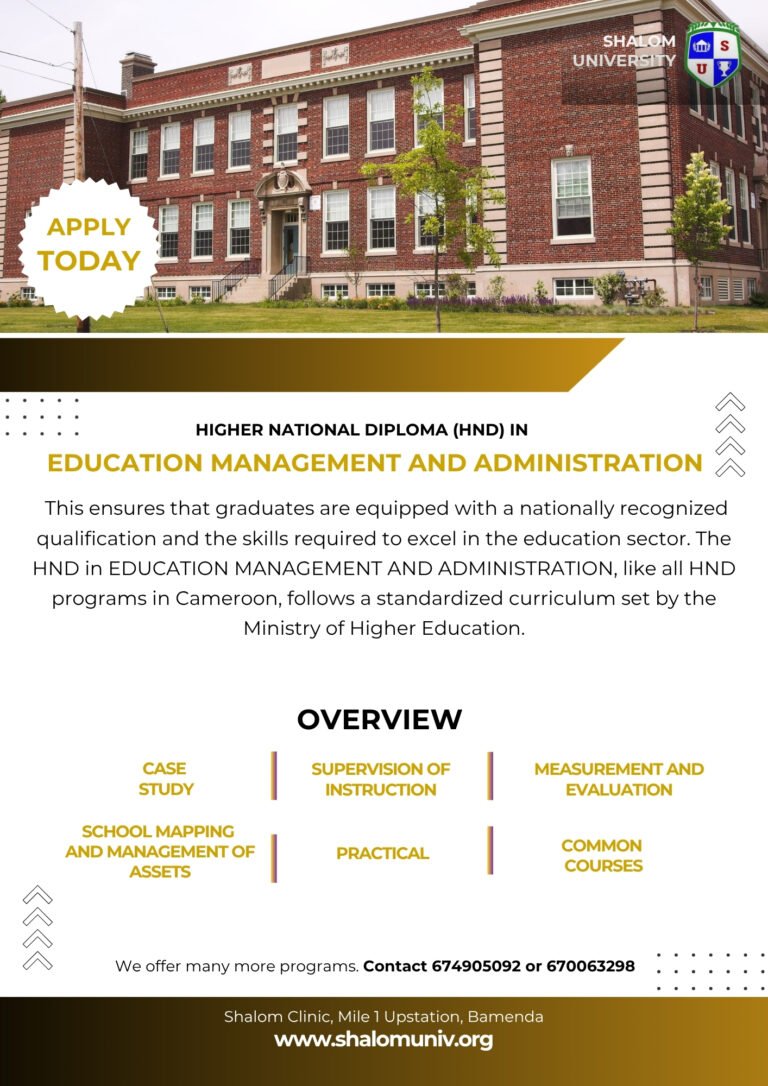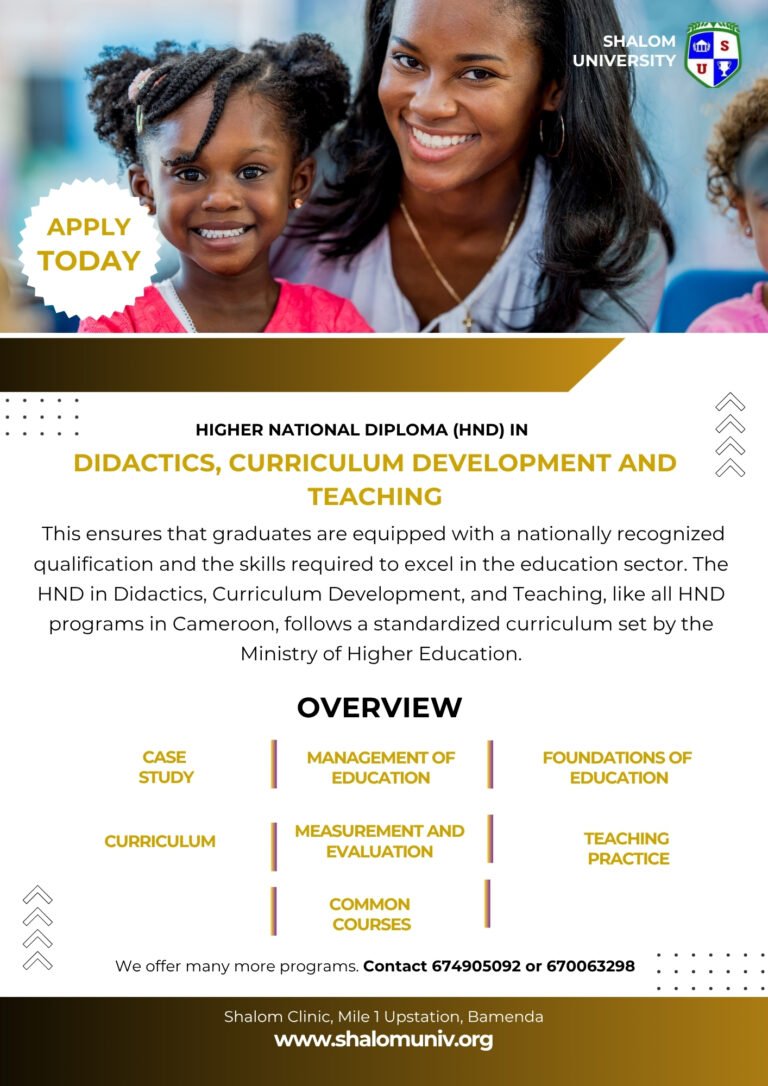In Cameroon’s quest for sustainable development, equipping adults with the knowledge, skills, and competencies needed to adapt to changing economic landscapes and advance their careers is of paramount importance. From workplace training and continuing professional development to community education and empowerment programs, the field of adult education, or andragogy, is a critical driver of progress. The HND in Andragogy (AND) at Shalom University in Bamenda is specifically designed to train these essential educators. This program provides aspiring andragogues with the theoretical knowledge and practical skills needed to effectively teach and support adult learners within the unique context of Cameroon’s diverse workforce and communities.
The curriculum at Shalom University is tailored to address the distinct needs and motivations of adult learners, blending core educational theory with hands-on training in adult pedagogy, community engagement, and practical application. Graduates are prepared not only to design and deliver effective training programs but also to understand the broader social context of education, ensuring they are well-equipped to drive positive change in a variety of settings.
The AND Curriculum at Shalom University
The HND in Andragogy program at Shalom University is structured around a set of core papers that provide a comprehensive and practical education in the field.
Paper: Case Study
The Case Study paper is a vital component that integrates all the theoretical knowledge and practical skills gained throughout the program. It challenges students to analyze complex educational scenarios involving adult learners, from designing a training program for a team of professionals in a corporate setting to developing a literacy program for a rural community. This is particularly relevant for andragogues in Cameroon, who must navigate diverse learning needs, cultural backgrounds, and resource constraints.
The course trains students to:
- Analyze real-world educational challenges: Based on a given case, students evaluate the learning needs, pedagogical strategies, or program design issues faced in an adult education setting in Cameroon.
- Identify critical issues and underlying causes: They pinpoint specific problems related to learner motivation, content relevance, or program delivery and explore the underlying social, cultural, and psychological factors.
- Propose evidence-based interventions: Students formulate practical recommendations based on andragogical principles, curriculum development theories, and local context. For example, a case study might involve a group of small-scale farmers needing training on new agricultural techniques, requiring a proposal for an accessible, hands-on learning program that respects their existing knowledge and experience.
- Defend their decisions: During formal presentations, students must justify their analysis and proposed solutions, demonstrating their critical thinking and communication skills, which are essential for effective educational practice and collaboration with stakeholders.
Paper: Adult Pedagogy
This paper focuses specifically on the principles and methods of teaching adults. It moves beyond standard pedagogical practices for children to explore specialized techniques that respect adult learners’ experience, autonomy, and goal-oriented approach to learning.
Key topics include:
- Andragogical Principles: The foundational principles of adult learning, including self-direction, experience-based learning, readiness to learn, and problem-centered orientation.
- Instructional Design for Adults: Techniques for designing and developing effective learning materials and training programs that are engaging and relevant for adult learners.
- Training and Facilitation Skills: Developing skills in facilitating group discussions, leading workshops, and using a variety of teaching methods suitable for adult audiences.
- Assessment in Adult Education: Methods for assessing adult learners’ progress and evaluating the effectiveness of training programs.
Paper: Sociology of Education
This paper provides students with a broader understanding of the social, cultural, and economic factors that influence education, particularly for adults. It helps andragogues understand the context in which their learners live and work, enabling them to design more relevant and impactful programs.
The curriculum covers:
- Education and Social Mobility: The relationship between education and social mobility in Cameroon and how adult education can contribute to social and economic advancement.
- Cultural Context of Learning: Understanding how cultural norms, values, and traditions influence learning and participation in educational programs.
- Social Inequality in Education: The various forms of social inequality that affect access to and participation in adult education and strategies for promoting equity.
- Education for Sustainable Development: The role of adult education in addressing broader societal challenges, such as poverty, health, and environmental sustainability, in Cameroon.
Paper: Practical
This is the hands-on, practical training component of the program, where students apply their theoretical knowledge in a supervised, real-world setting. Practical experience is fundamental to developing the competencies needed for effective andragogical practice.
The practical training includes:
- Field Placement: Supervised experience in adult education settings, such as corporate training departments, NGOs focused on adult literacy, or community development projects.
- Training Design and Delivery: Designing and delivering a short-term training program for a real-world audience, from needs assessment to evaluation.
- Community Needs Assessment: Conducting a needs assessment in a community to identify educational needs and design a responsive program.
- Material Development: Creating and adapting learning materials that are accessible and culturally relevant for adult learners.
- Action Research: Engaging in small-scale action research to improve an adult education practice or program.
Empowering Adult Learners for Progress
Graduates of the HND in Andragogy from Shalom University are well-prepared to enter the workforce in various roles across Cameroon’s educational, corporate, and non-profit sectors. They can serve as corporate trainers, adult literacy instructors, community development officers, or program coordinators for NGOs. Their proficiency in adult pedagogy, curriculum design, sociological context, and practical application, coupled with a deep understanding of the Cameroonian context, makes them invaluable assets to any organization seeking to educate and empower adult learners. The Case Study paper ensures that they are not just theoretically sound but also adept at applying their knowledge to solve real-world educational challenges. By providing a practical and contextually relevant education, Shalom University plays a significant role in nurturing the educational expertise crucial for fostering lifelong learning, personal growth, and sustainable development across Cameroon.




